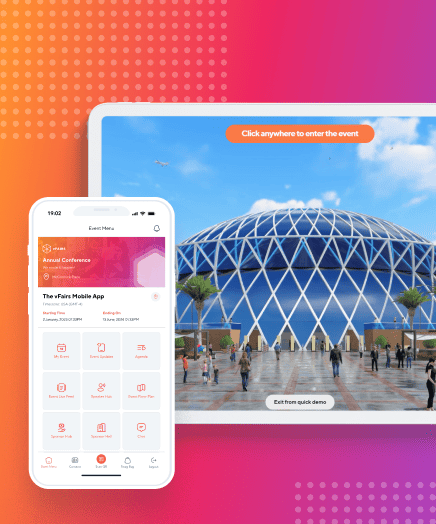It’s still quite easy to imagine the world going back to normal. We’re all ready for it to be just the way it was before the COVID-19 pandemic. We all want schools, cinemas, concerts, and offices to be reopened. Due to the recent rollout of vaccines, countries are currently reopening.
Even so, a lot of the alternatives we have found for workspaces, conferences, and meetings are here to stay. Are virtual events a part of these pandemic-survivors? Read on to find out.
Will Virtual Events Survive Beyond the Global Pandemic?
Well, Grandview Research reports that the virtual events industry has been on a steady incline, even for years before the pandemic. Pre-pandemic numbers estimated a huge boom in growth, with an estimated industry size of over $404 billion by 2027. That means that people were already picking up what the virtual events industry was putting down — at a rapid pace. One can only imagine the benefits new organizations were able to realize when they shifted online in 2020.
Let’s have a look at why that is.
Virtual Events Are Not a New Phenomenon
Remote work and meetings aren’t a new phenomenon. In fact, over the last decade, virtual meetings and events have been gaining popularity, especially amongst education and global tech-based institutions.
COVID-19 has changed the outlook of a great many people who could never consider the idea of remote work and online meetings into something productive and valuable. While people surely have lost a lot, we have seen that generally people who still had their jobs but now work remotely performed just fine.
Similarly, virtual and hybrid events have proved themselves to be a viable or even a better, alternative to live ones. Because of this, companies consider virtual and hybrid events as key components to their 2021 and even 2022 strategic plans. In fact, in a recent survey conducted by vFairs, over 57% of the respondents said that hybrid events would ‘dominate’ the future. Additionally almost 15% said virtual events would continue to grow.
Let’s look at why people are starting to bank on virtual and hybrid events, even as the world opens up.

Virtual and Hybrid Events Offer Numerous Benefits
Virtual events save a lot of time and cost. Add to that, when people attend events virtually, they are helping the environment by not consuming fuel and reducing their personal carbon footprint. Not to mention, paper is conserved, as well.
COVID-19 clearly caused a considerable reduction in pollution and other human impacts on the environment, and virtual events have definitely played their part in it.
Another benefit of adding a virtual element to events, as our clients have mentioned, is the analytics, metrics, and tracking to better understand how their events have performed.
It’s easier to get such real-time data from virtual participants compared to physical ones. And, hence, virtual events offer an idea of how well the event is going by looking at audience engagement and interactivity that is closer to reality.
Even if we go back to physical events like before, companies would benefit a lot from incorporating virtual aspects to their events to maximize the benefits they offer. Here are a few of the top benefits:
Freedom to Attend Remotely
Hybrid events give people a lot of freedom. A good deal of companies have realized that holding events virtually and working remotely does not have any adverse effect on productivity and output. Many are very open to letting people join events or work fully from home.
But this may not be the case with everyone. It all boils down to the vision and goals of the company as well as their culture. Similarly, not everyone may be open to the idea of virtual events.
Caters to Global Audiences in Various States of Shutdown
Reports have revealed that a lot of people will actually prefer virtual work even after getting vaccinated. And because big tech companies like Microsoft, Google, and more have extended the option to work remotely indefinitely, other companies are likely to follow suit.
The reasons people have given for not wanting to come back to work include not wanting to commute given the cost and time it takes up, getting acclimated to the work environment again, and finding their home to be a better workspace overall.
We can infer that virtual events will follow that lead, and cater to the many remote workers who prefer to join from home.
Increases Potential ROI
There are a few ways in which virtual and hybrid events can help improve potential ROI in the long-term. Firstly, virtual events generally cost less while maintaining or even increasing attendance numbers from physical events. With the overhead costs, cost of travel, and even time lost in employees schedules eliminated, virtual events are a great option for remote teams.
Additionally, virtual events offer extremely valuable event insights which hosts can use for further marketing and employer brand campaigns. Information like traffic within the event, most and least active segments, and even individual user journeys are all easily trackable in a virtual event. You just can’t get that type of information on the trade show floor!
So, Will There Be a Decline in Virtual Events?
All data points to ‘no’. Where some countries are successfully rolling out vaccines, other countries are still facing periodic resurges, which is keeping them from fully lifting restrictions. While some events such as shows and concerts and cinemas will need to come back at some point, it’s most likely that not all the industries will bounce back to the same level as they were.
Most of our clients say that virtual and hybrid events are beneficial enough for them to continue incorporating them in their marketing strategies. They’re eco-friendly, sustainable, and their best bet in the foreseeable future.
The Bottom Line
Virtual and hybrid events are here to stay, even as people get vaccinated and the world opens up. The COVID-19 pandemic helped open up a whole new world to companies weren’t ready to adopt virtual tools. Just like working remotely, virtual events have quickly sewn themselves into the fabric of our everyday life.
Taking into consideration the needs of remote participants is important for any organization. So making hybrid events a part of the future will be the right step forward.
Want to learn more?
Learn about our hybrid event solution!
See it here





